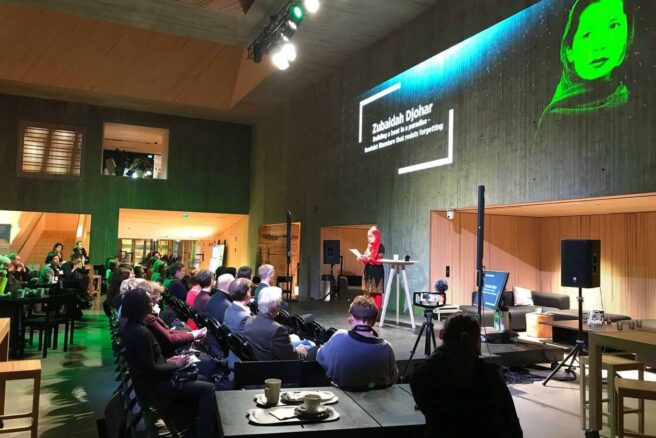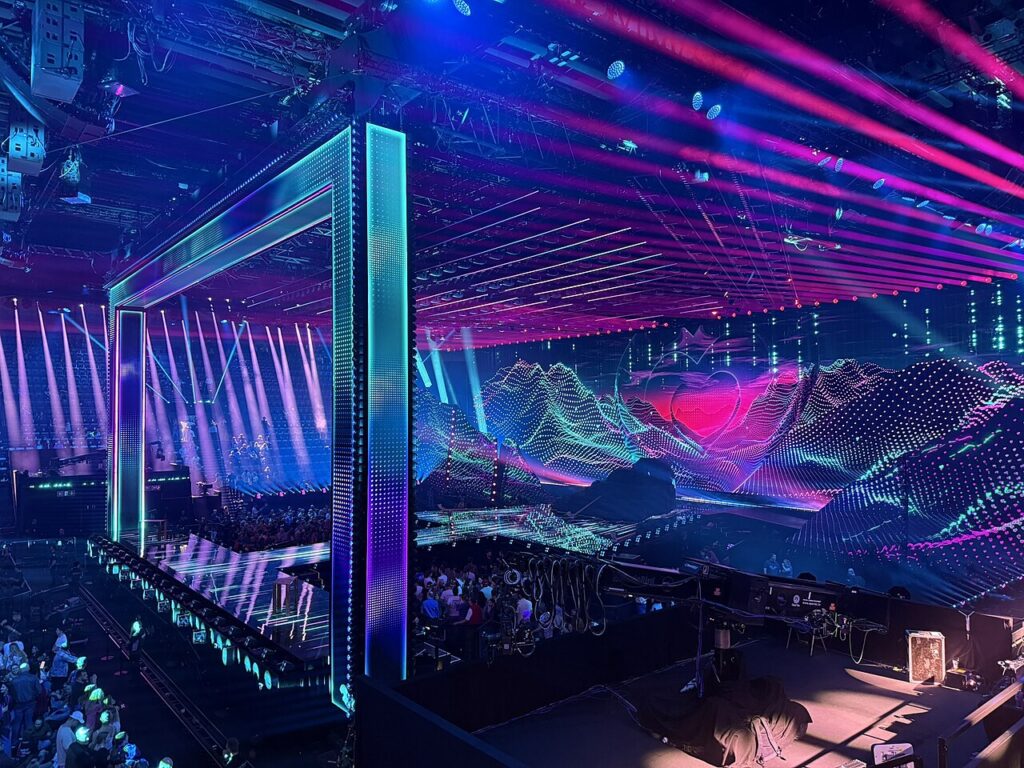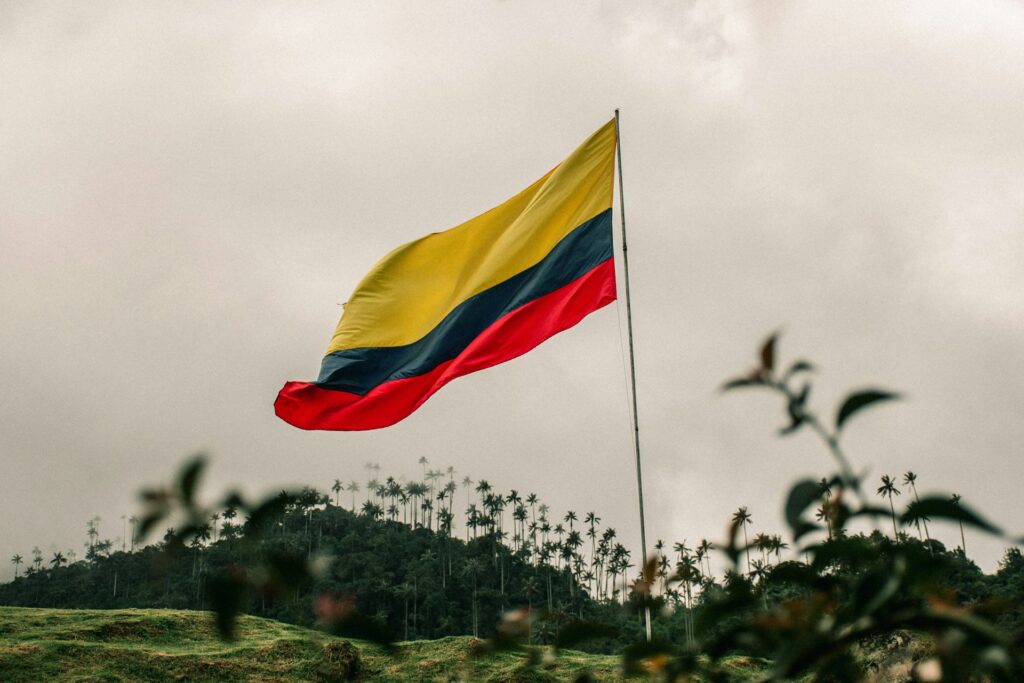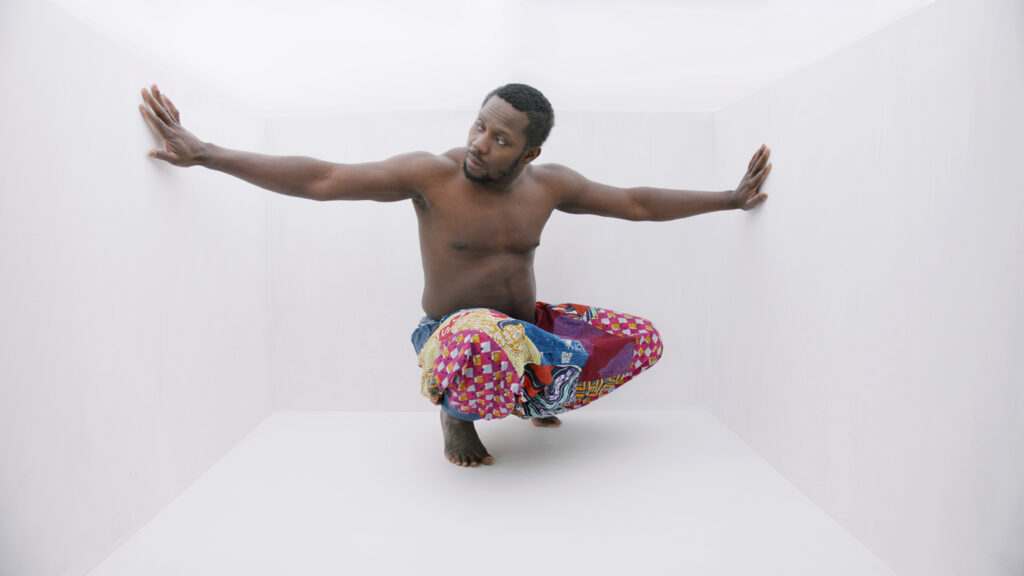The peace accords signed in Helsinki in 2005 brought peace to Aceh. Despite a decade of peace, much work remains for achieving an equal society. The struggle for equal treatment and possibilities continues with collaborative activities that respect the Acehnese traditions.
[vimeo 244982490 w=640 h=360]
Zubaidah Djohar is a researcher, trainer, humanitarian activist and a poet. She performed at the University of Helsinki’s Think Corner as part of her European tour at Europalia, International Arts Festival in Belgium.
Zubaidah Djohar’s poem collection Building a Boat in Paradise (Pulang Melawan Lupa) addresses the impacts of armed conflict on women, and women’s position during the first decade of peace in Aceh, Indonesia – a peace that was brokered in Finland by the president Martti Ahtisaari and CMI. Zubaidah’s poems speak of dealing with the past, sustainable development and peace building. In her performance, she also shed light on the challenges of the ongoing truth and reconciliation process in Aceh.
She dedicates the revenues of her poetry books for the recovery of the conflict victims through Acehnese women’s organisation Balai Syura Ureung Inong Aceh. Balai Syura has just completed its fourth All-Acehnese Women’s Congress at the end of November, focusing on the core themes of women’s leadership; fulfillment of women’s rights for victims of natural and social disasters; and fulfillment and protection of women’s rights for implementation of just Shari’a Islam.
In Finland, the peace in Aceh is often considered as completed and successful.
In Finland, the peace in Aceh is often considered as completed and successful, a perspective my research actively tries to challenge, as it is unhelpful for those who still struggle politically, economically and socially in its aftermath.
Through collaboration with Acehnese and Aceh-based scholars, activists and artists, such as Zubaidah Djohar, my research Scraps of Hope has aimed at studying the gendered social, political and economic complexities of the first decade of peace, through urban ethnography, but also through audio-visual short documentaries.
The sustainable but invisible
In his opening remarks of the event, the chancellor Kaarle Hämeri stressed that such a researcher, artist and activist collaboration is just one example of how University of Helsinki based researchers and scholars through their normal work can engage with mutual learning, support and commitment towards just and equitable peace.
Such long-term collaboration remains invisible and informal in nature in comparison with high-level diplomacy and peace mediation
Such long-term collaboration, however, remains invisible and informal in nature in comparison with high-level diplomacy and peace mediation. Yet, it has included for example, periods spent at the former heart of the Aceh conflict. Teaching at a University of Malikussaleh in North Aceh, where most of the students are first generation of university educated young adults of farmers and fishermen, and are children born and raised in the midst of conflict, but increasingly, the first decade of peace.
These all are just some concrete examples of forms of university collaboration and mutual visits and learning, which actively resist the demands regarding education export. Rather, long-term solidarity, learning from one another, and sharing experiences mostly requires time and dedication – which cannot be built with requirements of short-term policy relevant impact.
Building trust also requires balancing the power relations, which have colonial or even imperial tones-
Building trust also requires balancing the power relations, which have colonial or even imperial tones, where the Global North-based universities with more resources are in the driver’s seat setting the agenda, making strategic and financial decisions. Challenging these structures and research and teaching practices actively and constantly forms for me as a scholar an ethical imperative, which means questioning research praxis, including that of forms of collaboration, publication, and dealing with one’s own biases and tendencies to be blind for Eurocentrism and power relations that come with it.
Respecting the oral traditions
In quite humble ways, such a collective and reflective processes, and collaboration between higher education institutions, independent researchers, teachers, activists, and artists, could be called a form of cultural diplomacy and consequently, researchers as active builders of everyday peace.
This has concretely meant bringing diverse women and queer activist and feminist voices into dialogue on the challenges that remain in Aceh in the aftermath of the peace accord signed in Helsinki in 2005.
In the project Scraps of Hope, this has concretely meant bringing diverse women and queer activist and feminist voices into dialogue on the challenges that remain in Aceh in the aftermath of the Memorandum of Understanding, the peace accord signed in Helsinki in August 2005. Perhaps even more importantly, it has rendered possible the reflecting upon such challenges with a diverse group of Banda Acehnese and communicating the results audio-visually reaching wider audiences and respecting Acehnese oral history traditions.
Overall, 13 short documentary videos were produced in collaboration with documentarist Seija Hirstiö with the support of Finnish Cultural Foundations. Since 2016, they have travelled to invited talks and conferences, but also to Vantaa, where the peace negotiation took place. There they have been screened at Kilteri junior high school, Tikkurila library, and a pop up space Muuntamo at the heart of the Tikkurila’s new market square.
The first five shorts have been released for open access viewing: they consist of two Zubaidah Djohar’s poems ‘Peace for Whom’ and ‘Because You Are a Woman’, a punk song ‘Prison of Thoughts’ by Acehnese punk band Totaliter, and two reflective interviews ‘MoU Helsinki – Reclaiming Back History’ and ‘Shari’a and Visions for Peace’ both which focus on the “written-out-of-histories” of Acehnese peacebuilding.
After Zubaidah’s visit to Helsinki, she has revisited all the people whose life histories are narrated in the shorts, screening and discussing them, making a list of final editing suggestions and discussing the process and its relevance for demanding social and economic equality and justice in Aceh. All but two of the life historical shorts will be released for open access viewing in early 2018.
Zubaidah has revisited all the people whose life histories are narrated in the short films.
Two remain for only offline private screenings due to safety of the people in them. Videos will also be screened in Aceh in a number of community events, connected to the Truth and Reconciliation process, combined with Zubaidah Djohar’s poetry recital, and suggestions made by the individuals whose life histories stories are narrated in the short documentaries.
I will continue drafting chapters to a monograph, which I hope to be eventually published in an electronic format with videos, and video and audio clips embedded with texts. Not many academic publishing houses offer such publishing formats yet, but I am contacting publishers who are experimenting and finding solutions for media responsive publishing platforms.
Full list of shorts: https://issuu.com/scrapsofhope/docs/sohposter
The full Tiedekulma performance/event is available at: https://www.helsinki.fi/en/unitube/video/5cfca8fb-0e22-46a7-9698-aa92e4271911#.WiBIAff6aYA.link
Marjaana Jauhola is a Academy of Finland Fellow, Docent and University Lecturer, who currently conducts multi-sited research on urban everyday lives, social vulnerabilities and inequalities in the post-earthquake city of Bhuj, in Kutch district of Gujarat, India, and the ways that the 2001 ‘Gujarat earthquake recovery’ travels conceptually in disaster reduction/disaster resilience policies in India and beyond.
Video shot by Susanna Hast.




